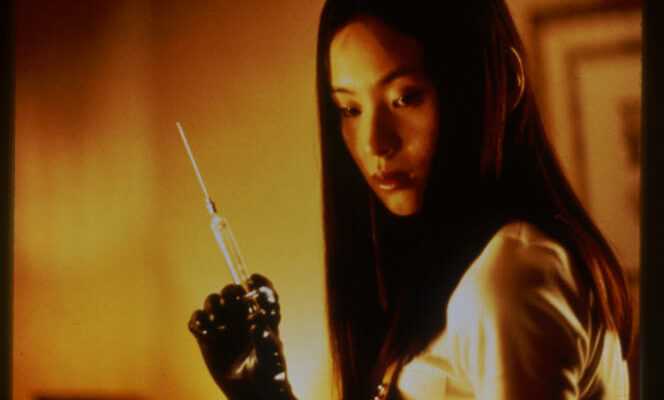Horror and fantasy are themes that have always haunted the history of Japanese cinema. Let us remember that one of the first Japanese films discovered in the West was a ghost story, Tales of the Wave Moon after the Rain (released in Japan in 1953, then in France in 1959), signed by a filmmaker yet not very representative of the genre, Kenji Mizoguchi, who adapted, in this case, a tale by Ueda Akinari. The 1990s saw the emergence of a generation of filmmakers who would modernize the genre, breathe new life into it, reinvent its rhetoric, in the anxiety of what was a strange nihilistic moment in Japanese cinematography.
Three films representative of this period are released in theaters in restored copies. If the fantastic in classic Japanese cinema had its roots in a rich and ancient folk and literary tradition, the films of the 1990s were inspired more by contemporary and trivial urban legends. Two titles are signed by one of the great craftsmen of the modernization of the genre, Hideo Nakata. Ring (1998) and Dark Water (2002) are ghost stories. Admittedly, this is charged with a kind of return of the repressed: guilt, remorse, symbolic and fatal resurgence at the same time of a primitive crime.
deep anguish
But what sets Nakata’s films apart and what has earned Ring to be so successful that it spawned sequels as well as a Hollywood remake, it’s the familiarity of a curse that takes the form of a videotape containing mysterious footage, all who watch it doomed to die within days. The contamination and the propagation of Evil are linked to an ordinary and banal world, and the consciousness of an imminent death becomes a motor of deep anguish. Dark Water rediscovers the theme of the ghostly apparition (that of a little girl who disappeared several years ago). Strongly anchored in reality and in the ordinary existence of a divorced woman forced to live alone with her daughter, the film uses the motif of water with a certain sense of morbid poetry.
Takashi Miike delivers with “Audition” a masterpiece, inspired as much by Georges Bataille as by an erotic-grotesque tradition of Japanese cinema
Hearing (1999) by Takashi Miike is not, strictly speaking, based on a supernatural postulate. A 50-year-old widower, television producer, imagines giving an audition to several apprentice actresses in order to find a new wife. The scheme seems to work since the man meets a young woman of mysterious beauty who seems to become attached to him. The mysterious disappearance of this one and the efforts that he will undertake to find her will be the beginning of a real descent into hell, of a nightmare nourished by increasingly macabre discoveries, increasingly bizarre events. Will man pay, in intense and refined physical suffering, the price of his hypocrisy?
You have 20.66% of this article left to read. The following is for subscribers only.
